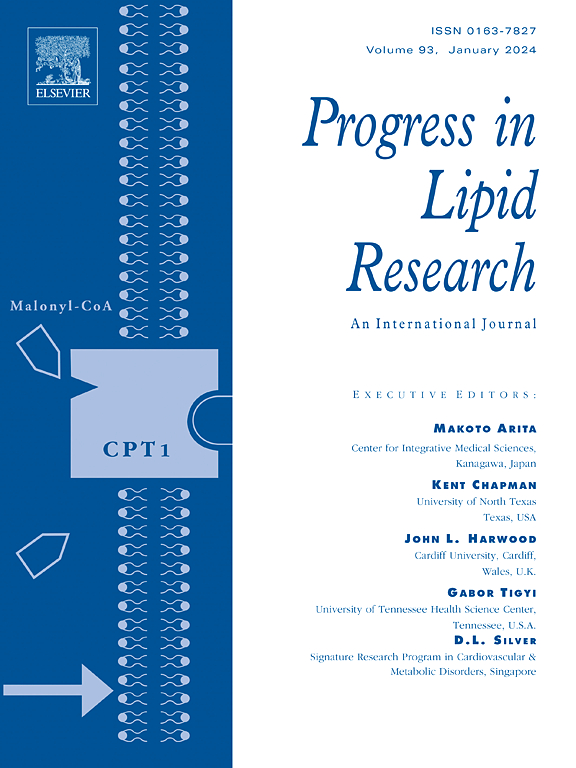PPARα 的脂质感应:在控制肝细胞基因调控网络和禁食代谢反应中的作用
IF 14
1区 医学
Q1 BIOCHEMISTRY & MOLECULAR BIOLOGY
引用次数: 0
摘要
过氧化物酶体增殖激活受体(PPARs)是由三种核受体组成的一个小家族,它们作为脂质传感器,从而调节在肝脏和全身能量平衡及其他过程(如炎症)中发挥关键作用的基因转录,对健康产生深远影响。过氧化物酶体增殖激活受体异型α(PPARα)在氧化组织中表达,尤其是在肝脏中,在适应性禁食反应中发挥关键作用。先进的全息技术使人们得以深入了解 PPAR 表达和活性调控的巨大复杂性及其对肝脏及其相关代谢器官生理机能的下游影响。在此,我们概述了肝脏中 PPARα 所控制的基因调控网络对禁食的响应。我们讨论了PPARα调控的酮体生成和成纤维细胞生长因子21(FGF21)(一种禁食和应激诱导的代谢激素)的产生对肝脏代谢的影响、全身反响和益处。我们还强调了目前在使用新方法进一步提高我们对 PPARα 在健康和疾病中的作用的认识方面所面临的挑战。本文章由计算机程序翻译,如有差异,请以英文原文为准。
Lipid sensing by PPARα: Role in controlling hepatocyte gene regulatory networks and the metabolic response to fasting
Peroxisome proliferator-activated receptors (PPARs) constitute a small family of three nuclear receptors that act as lipid sensors, and thereby regulate the transcription of genes having key roles in hepatic and whole-body energy homeostasis, and in other processes (e.g., inflammation), which have far-reaching health consequences. Peroxisome proliferator-activated receptor isotype α (PPARα) is expressed in oxidative tissues, particularly in the liver, carrying out critical functions during the adaptive fasting response. Advanced omics technologies have provided insight into the vast complexity of the regulation of PPAR expression and activity, as well as their downstream effects on the physiology of the liver and its associated metabolic organs. Here, we provide an overview of the gene regulatory networks controlled by PPARα in the liver in response to fasting. We discuss impacts on liver metabolism, the systemic repercussions and benefits of PPARα-regulated ketogenesis and production of fibroblast growth factor 21 (FGF21), a fasting- and stress-inducible metabolic hormone. We also highlight current challenges in using novel methods to further improve our knowledge of PPARα in health and disease.
求助全文
通过发布文献求助,成功后即可免费获取论文全文。
去求助
来源期刊

Progress in lipid research
生物-生化与分子生物学
CiteScore
24.50
自引率
2.20%
发文量
37
审稿时长
14.6 weeks
期刊介绍:
The significance of lipids as a fundamental category of biological compounds has been widely acknowledged. The utilization of our understanding in the fields of biochemistry, chemistry, and physiology of lipids has continued to grow in biotechnology, the fats and oils industry, and medicine. Moreover, new aspects such as lipid biophysics, particularly related to membranes and lipoproteins, as well as basic research and applications of liposomes, have emerged. To keep up with these advancements, there is a need for a journal that can evaluate recent progress in specific areas and provide a historical perspective on current research. Progress in Lipid Research serves this purpose.
 求助内容:
求助内容: 应助结果提醒方式:
应助结果提醒方式:


